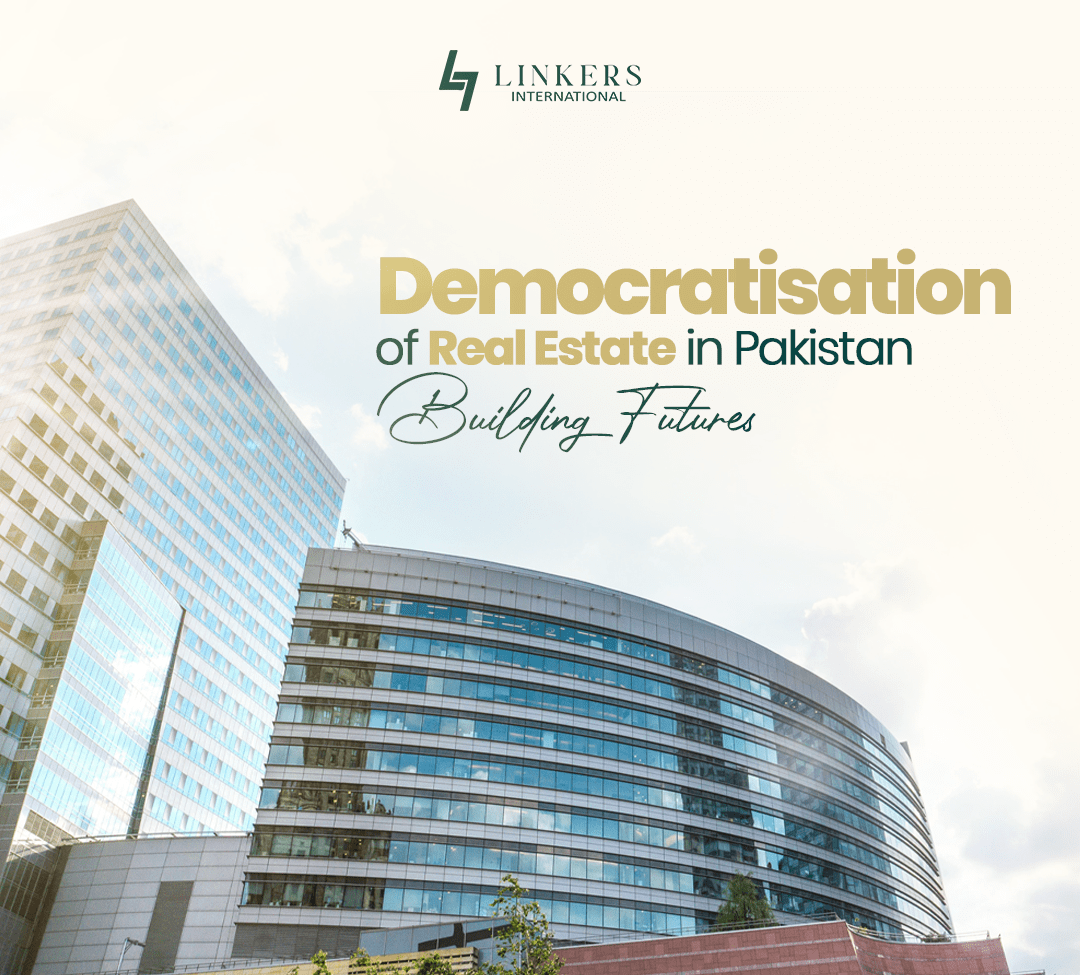For decades, real estate in Pakistan has been a game played by the few, for the few. Gated societies, speculative buying, skyrocketing prices, and land hoarding have locked out the middle and lower-income majority from meaningful participation in the property market.
But a silent shift is happening, and if nurtured correctly, it could unlock one of Pakistan’s most powerful engines for inclusive economic growth.
What Does “Democratisation of Real Estate” Actually Mean?

Democratising real estate simply means making property ownership, investment, and development accessible to everyone, not just the top 1%.
It’s about:
- Lowering barriers to entry through better financing.
- Creating transparency in property transactions.
- Making affordable housing a priority, not an afterthought.
- Using technology to level the playing field.
In a country where land has been a symbol of power, this shift could rebalance social and economic dynamics at scale.
Why Has Real Estate Been So Exclusive in Pakistan?

Let’s face it, real estate in Pakistan has mostly served as a parking space for black money and an asset class for the wealthy. Here’s why:
- Unaffordable Prices: Even a small 5-marla plot in urban centers is priced beyond the reach of most citizens.
- Opaque Transactions: Undisclosed values, under-the-table payments, and uncertain titles make property buying risky.
- Speculative Culture: Investors buy land not to develop, but to wait for prices to rise.
- Weak Mortgage System: Less than 1% of Pakistanis use mortgages to buy homes.
- Gender Disparities: A large majority of property is still owned by men, despite laws supporting women’s inheritance rights.
What Is the World Doing That Pakistan Can Learn From?

Pakistan is not alone in trying to make real estate more inclusive. Around the world, countries are finding new ways to democratise access:
- REITs (Real Estate Investment Trusts): Allow small investors to own shares in large commercial real estate portfolios.
- PropTech Platforms: Tools like Zillow (USA), NoBroker (India), and Property Finder (UAE) are making listings, documentation, and legal checks transparent.
- Blockchain Land Registries: Countries like Georgia and Sweden have started digitising land records on blockchain to eliminate fraud and middlemen.
- Co-living & Micro Apartments: Urban centers are promoting smaller, shared spaces to address affordability.
Are There Signs of Change in Pakistan?
Surprisingly, yes. Here’s where the winds are shifting:

- Punjab Land Records Authority (PLRA) and similar bodies are digitising land ownership, reducing fraud and disputes.
- REITs are slowly entering the market – Arif Habib Group and others have already launched public REITs.
- Online portals like Zameen, Graana, and Agency21 are simplifying property search and comparison.
- The Naya Pakistan Housing Program attempted to deliver low-cost housing for the working class (although with mixed success).
- Fintechs and Islamic banking are expanding access to Shariah-compliant mortgage products.
What Needs to Happen Next?
To truly democratise real estate in Pakistan, we need a coordinated push across five key fronts:

1. Transparent Regulatory Framework
- Enforce realistic DC (valuation) rates across cities.
- Digitise all land records and make them publicly verifiable.
- Implement a national real estate regulatory authority (RERA) to oversee developers.
2. Affordable Housing Development
- Incentivise developers to build vertical, affordable projects.
- Make public land available for low-cost housing through public-private partnerships.
- Encourage mixed-income neighborhoods to avoid social segregation.
3. Inclusive Financing Models
- Develop micro-mortgage products for daily-wage and informal sector workers.
- Expand Islamic mortgage options that are culturally and religiously accepted.
- Offer credit scoring for renters to transition them into buyers.
4. Technology-Driven Access
- Create an official government property portal with verified listings and e-titles.
- Use blockchain for tamper-proof transaction records.
- Promote mobile-based platforms for rural land transactions.
5. Awareness & Legal Education
- Educate citizens about their property rights, especially women and rural communities.
- Launch public campaigns to help people understand financing options and red flags in property deals.
Who Needs to Lead the Change?
- Government: Must lead with policy, infrastructure, and transparency.
- Banks & Fintechs: Should design inclusive mortgage and investment products.
- Real Estate Developers: Need to move away from luxury obsession and toward mass housing.
- Tech Startups: Have the power to simplify access and increase transparency.
- Citizens: Must demand fairness, ask questions, and stop treating real estate as a speculative lottery.
Final Thoughts: Let’s Build a More Equal Pakistan

Real estate shouldn’t be a privilege should be a path to security, dignity, and wealth for all.
Democratising real estate is not just about property. It’s about fairness, inclusivity, and long-term economic stability. It’s about ensuring that the mason who builds your house, the teacher who educates your children, and the clerk who handles your bank forms also have a fair chance to own a home, not just dream of one.
The future of real estate in Pakistan can be inclusive. But only if we design it that way.





